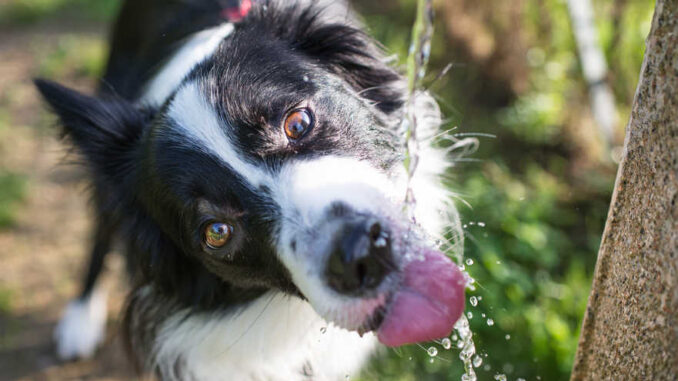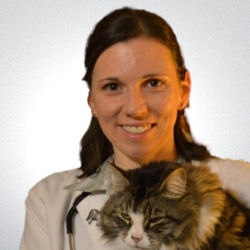
This article was updated on February 14th, 2024

For some dogs, the hacking and gagging sound of coughing always follows the lapping sound of drinking water. While coughing after drinking water may feel like the norm for your dog, you can’t help but wonder if it’s okay or if your pup is suffering in some way.
As a veterinarian, dog owners ask me questions about this common issue every week. In this article, I will explain when to worry and how to help your dog.
1. In most cases, there is no reason to worry about, if your dog recovers quickly
“It can be perfectly normal for a dog to cough every once in a while, after drinking water. If they aren’t distressed and they recover quickly from the issue, it’s likely no big deal.”
Some dogs are known for making a race out of eating and drinking, and a little water down the wrong pipe is a normal result of that. Some dogs may even vomit if they eat or drink too fast!
2. The most common reason why dogs cough after drinking is due to water entering the trachea by accident
It’s something that can be very common in dogs. After all, some dogs lack finesse and even control when they start to drink water, making it very easy for water to go where it shouldn’t.
Dogs have two tubes in their throats: the trachea (windpipe) and the esophagus (for food & water). Only one tube is used at a time. To keep things going in the right direction, the top of the trachea has a little lid called the epiglottis. The epiglottis ensures that food and water go down the esophagus.
“When a dog drinks very quickly, sloppily, and gulps a lot of air with it, the epiglottis can get a little out of rhythm and open when it shouldn’t, allowing some water to sneak into the trachea. The respiratory system doesn’t like liquids inside it and so will trigger the coughing reflex to expel the water.”
With this cause, dogs may cough intermittently or every time after drinking, depending on how fast they like to lap.
3. You should see a vet if your dog is experiencing discomfort, having trouble breathing, or if the cough has worsened over time.
“A few throat-clearing coughs after a refreshing drink may be expected for dogs that seemingly inhale their water. However, if those coughs start to become upsetting to your dog or severe enough that he has trouble catching his breath, it may be time to dig a little deeper.”
Here are the signs that there might be a problem:
- coughing after drinking is upsetting your dog,
- your dog has trouble catching his breath,
- your dog is having coughing fits at other times (not just after drinking water), or
- this is something that just started or is getting worse.
Let’s now look at common medical conditions that can cause dogs to cough after drinking.
4. There are medical conditions that can cause dogs to cough after drinking water
> Tracheal Issues
A dog’s trachea is made up of c-shaped rings of cartilage stacked on top of each other. The cartilaginous ring is completed by a thin sheet of muscle on one side to make a tube. In most dogs, this forms a rigid structure that is always open for air to come and go from the lungs.
However, in some dogs, that muscular side can be sucked in, creating a smaller and misshapen opening for air, known as a collapsed trachea.
When the trachea is collapsed, the epiglottis doesn’t completely cover it anymore, allowing some water to leak into the trachea when a dog drinks. Dogs with collapsed tracheas may also cough when they get excited and have difficulty breathing during exercise. Any age and breed can be affected, but small adult or senior dogs generally top the most commonly affected list.
Along with tracheal collapse, a dog may be born with a hypoplastic trachea, or one that isn’t formed properly. The size and shape of the trachea may be different to the point that the epiglottis can’t properly block water and food from coming in, and a dog will cough after drinking water. They may also have difficulty exercising and low energy. Hypoplastic tracheas are most commonly found in brachycephalic, or short-nosed, puppies.
> Kennel Cough
A highly contagious respiratory disease, like kennel cough, may be another reason that a dog coughs after drinking water. Anything that causes irritation to the throat may make a dog cough after anything, even water, touches it. Dogs with kennel cough may also have a runny nose, decreased appetite, and often have spent some time in a confined space around a lot of other dogs, such as at the groomer, boarding facility, or obedience class.
> Reverse Sneezing is often confused with coughing and is harmless most of the time
A reverse sneeze is a sound that a dog may make after drinking water when an irritant or water causes the larynx to spasm. It’s not technically a cough, but is a sound similar enough to one that it can be easily confused. Any dog can reverse sneeze at any time but is more common in brachycephalic breeds. See this video on YouTube showing a dog with a reverse sneeze.
5. Try calming your dog before offering water
“If your dog’s only issue is that they drink too fast, it’s time for some training. Don’t let them drink until they are calm and focused by having them follow a few basic sit or lie-down commands before drinking. Only offer small amounts of water or use a slow drinker water bowl or insert to slow down his drinking.”
If your dog suddenly starts to cough after drinking water or the coughing is getting worse and causing distress, it’s essential to seek veterinary attention for proper diagnosis.
You’ll also want to make sure to have your pup vaccinated against kennel cough if they frequent boarding or grooming facilities, dog parks, or obedience classes. Keep them away from other dogs that are coughing or ill as well.
6. Veterinarian’s diagnosis and treatments
Your vet will be able to look at and feel your dog’s mouth and throat. They can listen to their heart and lungs and even take x-rays to determine if there is a tracheal issue, kennel cough, or just an excited drinker. The history of when and how often the coughing happens is also an important piece of the puzzle.
The treatment for coughing after drinking water will depend on the cause:
Tracheal issues, including hypoplastic and collapsed tracheas, may be managed with anti-inflammatories, cough suppressants, and exercise restriction. Dogs should wear a harness rather than a collar while walking and try to avoid situations where they get overly excited.
Mild to moderately affected dogs won’t have many lifelong medications or treatments that will increase costs, so you’ll be looking at paying $200-$400 for diagnostic costs, including x-rays. Severely affected dogs may need surgery to place a stent in the trachea to keep it open. This may cost $2,000-$4,000.
Kennel cough will usually go away on its own within a couple of weeks. However, some dogs may appreciate cough suppressants and antibiotics to ward off secondary issues. They should also be separated from other dogs to prevent spreading it, and may want a few days of rest and relaxation. Expect to pay $100-$300 for diagnosis and medications.
What Does Coughing After Drinking Water Sound Like in Dogs?
Coughs in dogs may take on different sounds depending on what is causing them. Dogs that cough after drinking water may hack or gag as if trying to clear something from their throat. They may retch and actually bring up a little foam or water when they do. The cough may be shallow and fast or contain a couple of deep-in-the-chest coughs. Watch this video below:
They may also start to hyperventilate and make a coughing sound similar to a goose honk. Being able to describe the sound and frequency to your veterinarian is an important part of the diagnostic process, so get your listening ears ready whenever your dog takes a drink of water.
FAQ
Are senior dogs (7-8+ years old) more likely to cough after drinking water?
Coughing after drinking water can happen in any dog breed at any age. Senior dogs aren’t necessarily more likely to cough after drinking than any other age group. That being said, tracheal collapse is more likely to occur in adult to senior-aged dogs. There may be an element of senility that could have a dog losing focus on what he is doing in the middle of drinking water as well, which may bring on some coughing. Coughing at any time in senior dogs is something that should be taken seriously and checked out by a vet, as there are many serious medical issues that may be the cause.
Are certain breeds more likely to cough after drinking water?
Unfortunately, our brachycephalic, or snort-nosed, breeds are more likely to cough after drinking water and have other respiratory issues as well. Bulldogs, Pugs, and Boston Terriers, to name a few, may all have more issues with reverse sneezing and airway irritation due to their facial and tracheal anatomy. Yorkshire Terriers, Pomeranians, and Chihuahuas are all more prone to tracheal collapse. Meanwhile, large, goofy breeds, like Labs and Golden Retrievers, may gulp rather than drink their water, leading to coughing after drinking.
Disclaimer: This website's content is not a substitute for veterinary care. Always consult with your veterinarian for healthcare decisions. Read More.




This article offers an insightful look into the reasons behind dogs coughing after drinking water, including tracheal issues and reverse sneezing. It’s interesting to note the connection between reverse sneezing and irritants, as explored in the reference on dog sneezing. Understanding the causes, such as water entering the trachea or underlying conditions like kennel cough, equips dog owners with the knowledge to recognize and respond appropriately. The provided solutions and guidance on when to seek veterinary care make this a valuable resource for ensuring the well-being of our canine companions.